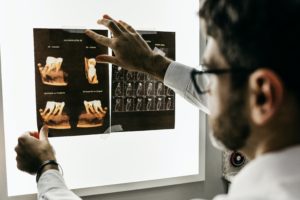
Wisdom tooth extraction is one of the most common oral surgery procedures in America, with almost five million performed annually. It’s a booming industry, collectively costing Americans around $3 billion in dental care expenses and causing many to wonder if the procedure is even necessary. Unfortunately, it is. But what about afterwards? Although the surgery is a lot, so is the recovery when you deal with pain, changes to your diet, and must be mindful of any additional problems. Our experts in Knoxville are well-trained in wisdom tooth removal and aftercare. Here’s what you should know.
Your Wisdom Teeth Explained
The removal of wisdom teeth is a very common procedure and does not indicate poor dental hygiene. The truth is that wisdom teeth are typically not necessary and can send teeth out of alignment. The reason is because there is not enough room in your mouth to accommodate them, and not removing them can lead to uneven bites, crooked teeth, and more.
Around 40% of people do not have them to begin with. X-rays are used to determine how many you may have and whether it will impact your existing teeth. If needed, an oral surgeon that specializes in wisdom teeth will make incisions into a patient’s gum line to remove the bone and teeth. This most often requires sedation, and most prefer anesthesia. Following removal, the oral surgeon will clean the site and place stitches where your wisdom teeth once were.
Problems Caused by Wisdom Teeth
Wisdom teeth are commonly referred to as your ‘third molars,’ as they are usually the last to grow and may never break through the gum line. This is known as impacted wisdom teeth. Wisdom teeth that do not grow properly can impact alignment, damage other teeth, lead to infection, tooth decay, cysts, or other jawbone issues. Certified specialists can help you determine if wisdom teeth removal is needed and how to follow up regarding aftercare.
Aftercare for Wisdom Tooth Removal
So, what should you expect after surgery? It’s important to know that there will be some pain involved. Many patients also report bleeding, inflammation, and swelling. This can last for several days, yet the most critical time period is 24 hours after surgery. Following surgery, patients will need someone to drive them home due to being under anesthesia. Likewise, any prescription medication given by the doctor for pain will impact your ability to drive, and our surgeons at Knoxville Oral and Maxillofacial Surgery advise against it with no exceptions.
During the first 24 hours, avoid drinking through straws, using mouthwash, and brushing over the extractions. There should also be no smoking or alcohol usage. Many report to work after the next day, but it is recommended you take your time and not rush back into any strenuous activity. Heavy exercise should be avoided for at least a week to prevent blood clots from breaking loose.
The Wisdom Tooth Extraction Site
The areas where your wisdom teeth were extracted take longer to heal. Sometimes it can take as long as six weeks before patients have fully healed. You should receive pain medication and ice packs. Gargling warm salt water can also help soothe any pain. Common prescription medication, such as hydrocodone and oxycodone, should be used only as prescribed and disposed of once they are no longer needed.
What to Eat After Wisdom Tooth Removal
Your surgeon will go over what you can and cannot eat. This typically depends on your healing, though you should start with softer foods and not go overboard too quickly. Some report only being able to drink liquids, though you should not use a straw for at least 24 hours after surgery.
As patients recover, they may begin eating solid foods again. It is recommended you avoid foods that are spicy, acidic, or hard to chew. Nuts and granola can increase irritation and disturb the extraction site with their rough texture. Spicy and acidic foods also contain chemicals that can disturb the area.
Infected Extraction Site
If you experience pain, swelling, or fevers, there is a chance the extraction site of your wisdom teeth is infected. Some of these symptoms are common following surgery, but if they persist after 24 hours you should contact help immediately. Dry socket is less common but should still be watched out for. This is when blood clots become dislocated. That’s why you should be careful with resuming any exercise. Most patients report intense pain from dry sockets two to three days after surgery, when they try to resume normal activities. Your oral surgeon will manually irrigate and dress the wound.
Find an Oral Surgeon Near You
Wisdom tooth extraction is mandatory for many people. It can be the last major oral surgery as a teen or young adult. The aftercare is rather simple despite the intensity of the surgery, so long as you are very careful during the first 24 hours most patients have no issue afterward. The best thing you can do is find a good oral surgeon near you. If you live in the greater Knoxville area, we would love to be the ones to help you with this process. Check our website to schedule an appointment today.